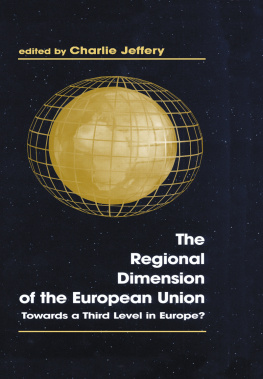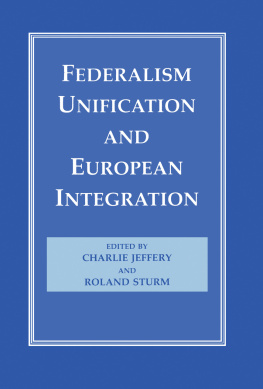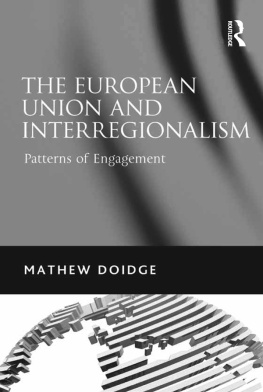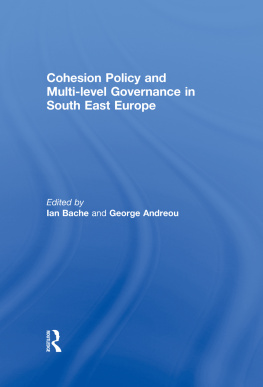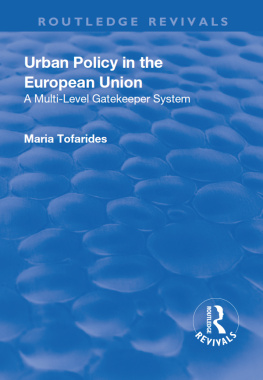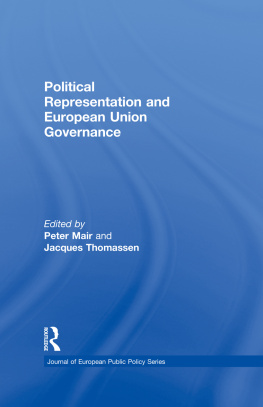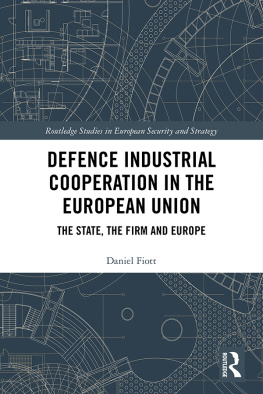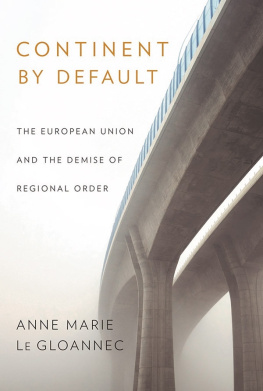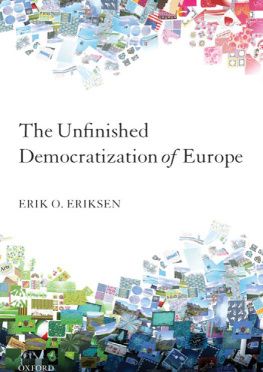Notes on Contributors
Jan Beyers is a Research Assistant in the Department of Social and Political Sciences at the University of Antwerp, and is working on the negotiating behaviour of officials in the working groups of the EU Council of Ministers. He has published recently on this subject in Res Publica and Tijdschrift voor Bestuurskunde en Publiek Recht and was co-author (with Bart Kerremans) of 'European Integration and Belgian Politics: The Dilemma between Autonomy and Cohesion', in K. Hanf and B. Soetendorp (eds), Small States and EU Membership (1996).
Udo Bullmann is a Lecturer in the Institut fr Politikwissenschaft at the Justus-Liebig-Universitt Giessen. His current work focuses on regional politics in the EU and the reconstruction process in the new Lnder of eastern Germany. He is editor of Die Politik der dritten Ebene (1994), and recently published (with Gerry Stoker and Brian Hogwood) Regionalism. Report to the Local Government Management Board (1995).
Carlo Desideri is Senior Researcher at the Istituto di Studi sulle Regioni of the Italian National Research Council. His main fields of interest are the history and evolution of regionalism in Italy and the EU and environmental politics and policy. He recently contributed on Italy to B. Jones and M. Keating (eds), The European Union and the Regions (1995) and was editor of Qualita dell'Aria e Automobili (1996).
Charlie Jeffery is Deputy Director of the Institute for German Studies at the University of Birmingham and co-editor of Regional and Federal Studies. He is working on multi-level governance in the EU and the role of the German Lnder in the European policy process. He recently published 'Towards a "Third Level" in Europe? The German Lnder in the European Union', Political Studies (1996), and is currently preparing a second edition of his German Federalism Today (1991).
Peter John is Lecturer in Politics at the University of Southampton. He has worked on a range of fields, including policy networks, rational choice politics and, in particular, sub-national government in the EU. Among his recent publications on the latter is 'Centralisation, Decentralisation and the European Union: the Dynamics of Triadic Relationships', Public Administration (1996).
Bart Kerremans is Assistant Professor in International Relations and European Integration at the University of Antwerp and also teaches at the Catholic University of Brussels. He works on EU decision-making and external relations and on the role of Belgium and its sub-national entities in the EU. He has most recently published 'Do Institutions Make a Difference? Non-Institutionalism, Neo-Institutionalism and the Logic of Common Decision-Making in the European Union, Governance (1996).
John Loughlin is Professor of European Politics at the School of European Studies, University of Cardiff in Wales. He has published widely on regionalism and federalism as well as on Southern Europe. Among his recent publications are (edited, with Michael Keating) The Political Economy of Regionalism (1996) and (edited, with Sonia Mazey) The End of the French Unitary State: Ten Years of Regionalization in France, 1982-1992 (1994).
Gary Marks is Louis Rubin Professor of Political Science and a Director of the Duke/UNC Center for European Studies at the University of North Carolina at Chapel Hill. He writes on labour politics, the European Union and multi-level governance. His most recent book (with Fritz Scharpf, Phillipe Schmitter and Wolfgang Streeck) is Governance in the European Union (1996).
Michael Morass is Deputy Head of the Department for EU-Coordination in the Federal Chancellery, Vienna, and Lecturer at the University of Innsbruck. He writes on European integration, federalism and Austrian politics and is the author of Regionale Interessen aufdem Weg in die EU (1994).
Vincenzo Santantonio is Senior Researcher at the Istituto di Studi sulle Regioni of the Italian National Research Council. His current fields of research are public law, intergovernmental relations, regionalism and legislative issues in Italy. Forthcoming publications include 'La solidariet tra Regioni', in Proceedings of the International Conference on Regionalismo, Federalismo, Welfare State (1996). He is currently editing a book on aspects of federalism in Germany and Austria.
Andy Smith has recently been appointed Charg de recherche, CERVL, Institut d'tudes Politiques de Bordeaux. He has written extensively on EU regional policy, including most recently L'Europe politique au miroir du local. Les fonds structurels et les zones rurales en France, en Espagne et au Royaume Uni (1995).
Sabine Weyand is an official in Directorate-General III (Industry) of the European Commission and is co-author, with Rudolf Hrbek of Betrifft: Das Europa der Regionen (1994).
This contribution presents an overview of the politics of the Third Level, that of sub-national government, in the EU. It presents a typology of the diverse structures of sub-national government in the EU and accounts for the growing importance of the Third Level in terms of a complex interaction of 'top-down' factors, where sub-national government has in some sense been empowered by changes in the international economy and processes of economic modernization, and 'bottom-up' factors, where sub-national demands for greater decision-making powers have, at least in part, been met. An assessment of the significance of these top-down and bottom-up processes for ELF decision-making follows, which concludes cautiously by stressing how the internal structures of the member states still condition sub-national capacities to make a mark in Europe and limit the wider significance of the Third Level.

